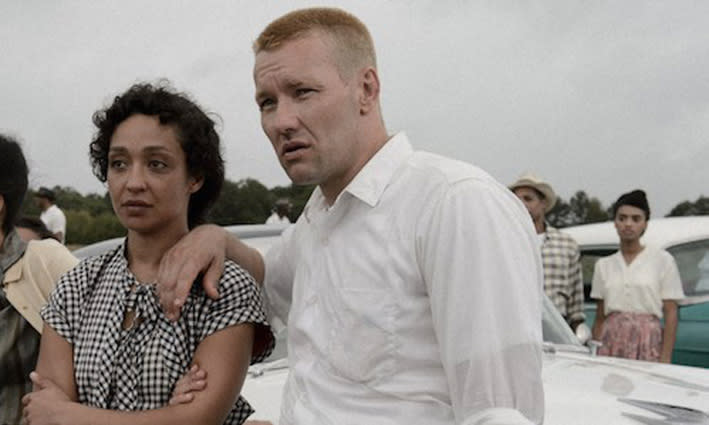Peter Kujawski On The New Focus Features And Its Cannes Competition Entry ‘Loving:’ Q&A

Universal Pictures shocked the indie sector with its third overhaul of prestige film division Focus Features in a relatively short time. The long-running New York-based team of James Schamus and Andrew Karpen gave way to a genre-centric operation run by Peter Schlessel from Los Angeles, and then the deck was re-shuffled again in February. Peter Kujawski, who had left Focus several years ago when elevated to managing director of Universal Pictures International Productions, returned as chairman. Abhijay Prakash became COO and Robert Walak president, also moving over from UPIP, which was folded into Focus. The new strategy sounds much like the Focus of old, with a twist: heavy on prestige pictures but with a cohesiveness with Universal because of the overseas expertise of the management team. That team came right out of the gate in Berlin and acquired the Jeff Nichols-directed Loving after watching a few scenes and reading a script. Nichols worked hard to have it ready for its Cannes premiere in competition tomorrow. The film stars Joel Edgerton and Ruth Negga as Richard and Mildred Loving, an interracial couple that married in 1958 and found themselves prosecuted in Virginia and sent to prison. The couple fought until the miscegenation law was overturned in 1967 by the Supreme Court in a landmark Civil Rights case. Focus has made these kind of movies before, from Brokeback Mountain to The Theory of Everything, but Loving gives a glimpse at the kind of socially conscious films Focus hopes to make in a pastiche of home-grown films and acquisitions that will cover both domestic and foreign, and sometimes a mix of both of those. Focus acquired foreign territories on Andrea Arnold’s American Honey here and has foreign territories on the Pedro Almodovar film Julieta, also playing here in Cannes. Kujawski here explains what he hopes for new Focus Features; he is the rare exec who knows the other two iterations. He started at the original Focus long ago, and at UPIP kept a hand in Focus deal making that included last Cannes’ record world rights deal for Tom Ford’s Nocturnal Animals, which Focus will release during Oscar season.
DEADLINE: This is your 15th Cannes, but the first where you are the boss at Focus Features, the place you worked at your very first Cannes. What was that first Cannes like?
KUJAWSKI: I was extremely fortunate as an extremely junior member of the team to sit down with a big group and watch The Pianist, then get to stand around in a circle outside the theater with all of our jaws dropped to the ground at the achievement and say this is a massively important movie that’s going to really touch people. This was the first Cannes for Focus Features, which literally had been formed three weeks prior, to be able to take a swing at a movie like this. We had that experience at Cannes, right away. In my fifteenth Cannes, we are getting an experience that is almost exactly the same. We piled into a theater in Berlin, watched the footage of Loving and stood outside that theater in a circle with our jaws dropped saying oh, my God, this is absolutely who we want to be and what we want to do. To get that movie and have it premiering this Cannes a few months later, and introducing that movie to the world? A lot of the landscape has changed, along with the deal making philosophy and the business around us, and that has brought certain extra pressures. But at the core, Cannes hasn’t changed a bit in that most important way.

DEADLINE: Can you crystallize what the new Focus Features is?
KUJAWSKI: The change you’ll notice quickest from the last iteration to now is, we are getting out of the genre space, or at least what I’ll qualify as the pure genre space. The commercial popcorn genre movies, that’s not the Focus business anymore. The bigger studio will be doing that.
DEADLINE: Through Jason Blum’s Blumhouse?
KUJAWSKI: Exactly. We’ve got a very good relationship with Jason and we’re built operationally to allow him the space to make his movies. That’s the most obvious difference. Frankly, the content philosophy in this version of Focus is going to be very, very similar to that of the Focus. It is going to be driven by filmmakers, and by that first questions you ask in a meeting. Do we love this? Do we think this can be great? Do we think this can touch and move people? Do we think this can have an impact on the cultural conversation? Do we think the experience of this movie is going to be unique and exciting? If it passes that bar, then we apply our business model, which is different, one that lets us enter the fray in more ways than we could in the original version of Focus. That was pretty standard domestic distribution and international sales. Here, we can buy the movie for the world; we can buy domestic rights without necessarily having international, or international rights without necessarily having domestic. We can buy domestic, and key international territories if that’s all that’s left, like we did when we bought Loving in Berlin, off footage. The philosophy driving it is always going to be about the audience experience and dialogue with the kind of filmmakers that we love. It’s important though that we establish exceptions. Are we going to do a classic genre popcorn teen horror movie? No. Are we going to chase and pursue opportunities like The Witch? That will happen ten times out of ten.
DEADLINE: Why?
KUJAWSKI: If it’s a filmmaker who has created a movie that is unlike anything that I’ve seen before, that can meaningfully sit and be compared to past works from previous cinematic masters, we want that sort of genre in our business. We have The Coldest City on our slate. That is Charlize Theron and James McAvoy, in a pre-fall of the Berlin Wall spy action movie. That log line doesn’t sound like what I’m talking about. Then you layer in on the fact that’s is Dave Leitch directing. He did John Wick, which was to me and all of us at Focus one of the most inventive stylish, unique, totally cool, fresh takes on an action movie. And Charlize, who has become one of the biggest stars in the world, she is absolutely crushing it in this movie with a director doing something fresh and unique and creating a special experience for an action movie audience. That’s also going to be a Focus movie, ten times out of ten.
DEADLINE: Do you expect your priority to be acquisitions like Loving, or home grown films?
KUJAWSKI: We are growing a lot of things internally, though it is still early on that. A major part of our growth plan is going to be our close partners Tim Bevan and Eric Fellner at Working Title.
DEADLINE: You left Focus but stayed within Universal, and most recently you were managing director of Universal Pictures International Productions. How did this international experience help you shape what Focus is going to become under your leadership?
KUJAWSKI: My story within Focus was always tied to the international piece of our business; I did our international sales during my time at Focus and worked with and sold movies in to literally every territory in the world, working closely with the distribution partners that we had at Focus at the time. That’s why I was able to step in to the Universal role that I did in 2011, at a moment where the studio wanted to lean into a worldwide acquisitions business while making sure we were maximizing our international family. We were filling the domestic capacity and needed to fill them internationally and supply the TV clients and things like that with a supply they expect from a major studio. I embedded with the international team for five years. We had a green light process that was consensus driven across that whole organization. Before we’d come to Cannes, there was much sharing of scripts and acquisitions with the head office guys and then we’d send them out to the territory guys and really would have real conversations about this. That left us with projects we loved and believed in and we would hold hands and take that jump together which became a strength of the business. Even when it was a challenging piece of material compared to the main slate stuff, we’ve all said yes and committed to support it through the life cycle of the movie. That led to three months ago, coming in with new leadership of Focus. We are orienting the business back in to the space of being a global business that Focus was always conceived to be. But this time, the global business we are is beyond selling rights. We are tied in on a day to day operational basis with all the teams around the world that are distributing movies.
DEADLINE: You mean a more cohesive relationship with Universal Pictures rather than when Focus operated as a freestanding silo?
KUJAWSKI: Absolutely. In the first three months of doing this job we’ve already changed our green light process. We are not simply sitting in the room, with Focus as a domestic distribution company making a decision and then delivering it in to the rest of the studio. We have the international team in the room with us and we’re talking about the pros and cons and again building consensus and trying to green light movies that we think have global appeal. There are going to be times when we all are jumping up and down and saying we have to have this, we love it, it’s going to be a global hit. There are also going to be times where we say, domestically this could be a challenge but we want to take it on. There will be some films with more international upside.
DEADLINE: But you are at heart a prestige film company. How does it hamper or help, getting input from Universal, which has commercial tastes and knows what do to with The Mummy or those other franchises, but might look at a movie like Loving and feel it doesn’t check off the boxes necessary to succeed globally?
KUJAWSKI: Well, that really was not the case. I think you’ve seen a process put out of the time where we were buying movies as Universal that were very much in the spirit of what Focus is now.

DEADLINE: Which films do you mean?
KUJAWSKI: Boyhood. The very first movie that we bought as Universal under the time I was running the acquisitions team was JC Chandor’s All is Lost, from a thirty page script-ment. There’s no dialogue in the movie so it’s a very short script. Lionsgate had domestic, but our deal on that movie actually represented the lion’s share of the financing. We read the script and said, this is amazing, unique; this is a filmmaker that I love and believe in. David Kosse was running international for us; he read it and he immediately got it. So did Donna Langley. I said I was aware this was the first thing I’m doing and it probably wasn’t what we all conceived we would do.
DEADLINE: A movie with one actor, filmed on the water, with no dialogue…
KUJAWSKI: Yeah. And that rippled through; we had a bunch of people on the domestic team read it and we all said this is great; we’re going to hold hands and do this and it did well for us. We were here at Cannes with that movie, it was in competition, and it was the toast of the town when that movie screened. I don’t know if you remember but it was absolutely a rousing reception and proved to be a very successful movie for us…
DEADLINE: Really? The perception was it didn’t do well, at least domestically. It fared better overseas?
KUJAWSKI: Yeah. Look, these aren’t massive gross numbers but I think the idea is that these movies don’t necessarily need them. We want that kind of success as well in the overall organization and there’s real support for that in the overall organization for that, and it’s not like they’re doing favors for Focus. Loving was the same, and so was The Witch when we watched that movie at Sundance. It was just so good, the execution level was so high. There was not a moment of hesitation from the studio. We saw that on Theory of Everything, and then it repeated itself on The Danish Girl, a tremendous success as a creative endeavor and a tremendous success as the ability for us as the Focus team to get that out there and have Alicia Vikander win the Oscar. We wish the movie had performed a little bit more domestically but it doesn’t matter because it’s still quite a win for us when the movie does over fifty million dollars internationally.
The previous iterations of Focus, the green light would have been oriented to the domestic potential of the movie, and it’d be a lot harder to get to the point where we pulled the trigger on it than now, where we’d have this sort of international viewpoint on the movie. You’ll see these kind of green lights come from us now a little bit more that are internationally oriented, where something has breakout potential. We’ll leverage the strength of our international operation to get as much as we can out of the international marketplace. The goal is, a couple of times a year, that we’re doing stuff that on a global level we see huge upside both domestically and internationally. We’ve got a flexibility, building toward a green light on these movies that allows that first metric to be: can this be great, and is this a filmmaker we love? If the answer to that is yes, it gets to the next level of conversation; how can we build a model, find a path for this movie to succeed.

DEADLINE:
Loving doesn’t come out until November 4. Why bring it here to Cannes half a year early?
KUJAWSKI: It was driven by a belief in the movie and the level of execution Jeff Nichols brought to this movie on a humanist level. The relationship the audience will form with these characters is very meaningful, profound and we wanted to start building that in anticipation of June 12, which is Loving Day. We look at this film as first and foremost an epic story of love that literally changed the world. We wanted to come here to introduce that kind of cultural dialogue and start to get the word out about how this movie is that love story and that it’s not a purely civil rights and Supreme Court case movie. There is a far more complex, emotive and human agenda than that. This gives us a chance to begin to curate a cultural conversation this movie can launch. We will know early next year whether this was a financial success, but the idea of using this movie to start conversations about these issues, and how peoples’ lives and events that are happening now can be directly impacted by dialogue that starts because this movie is in the world, that’s important to us, too.
Related stories
Jeff Nichols On 'Loving', Cannes And Self-Reflection: The Deadline Q&A
Focus Acquires Key Offshore Markets On Andrea Arnold's 'American Honey' - Cannes
Get more from Deadline.com: Follow us on Twitter, Facebook, Newsletter

